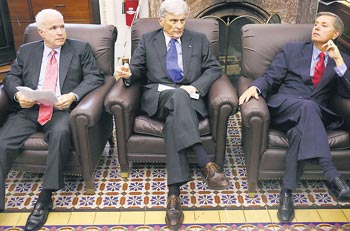|
Republican
rebellion for a “right” cause
By
Thalif Deen
NEW YORK - When US newspapers ran
horrifying pictures of American soldiers humiliating
and torturing Iraqi prisoners in the now-notorious Abu
Ghraib prison outside Baghdad last year, there was an
international outcry that the Bush administration was
violating the Geneva Conventions governing the treatment
of prisoners of war. Even President George W. Bush,
who swears by Christian ethics and puritan moral values,
was outraged by the photographs taken unsuspectingly
by fellow soldiers and circulated on the internet and
later in the mainstream media.
 |
| (L-R) Members
of the U.S. Senate Armed Services Committee Senator
John McCain, Committee Chairman John Warner, and
Senator Lindsey Graham discuss the White House's
proposed legislation for trying terror suspects,
during a press conference at the US Capitol on Wednesday
in Washington, DC. The three Republican senators
believe the White House proposal for military tribunals
would alter the United States' commitment to the
Geneva Conventions. AFP |
As one comedian joked, Defence Secretary
Donald Rumsfeld, who was indirectly held responsible
for the transgressions of American soldiers, apparently
told senators that the Geneva Conventions on prisoner's
rights certainly applies in Iraq, but not for prisoners
held in US detention facility in Guantanamo Bay. Asked
why, Rumsfeld supposedly said "nobody has pictures
of Guantanamo Bay."
So the (im)moral of the joke is: unless you get caught
with your underpants down, the Bush administration can
keep infringing international conventions. And the Geneva
Conventions specifically call for the humane treatment
of prisoners of war. Last week, even some Republican
senators of the governing political party were angered
by an attempt by the White House to re-define a key
provision of the Geneva Conventions.
If the White House backed legislation
is passed, the Central Intelligence Agency (CIA) will
have the right to "alternative interrogation practices"
for terrorism suspects — leaving room for wide
new interpretations of the Conventions which were adopted
back in August 1949 and came into force in October 1950.
Article 3 of the Geneva Conventions, which the Bush
administration wants to bypass, specifically lays down
guidelines on how prisoners and detainees should be
treated.
To this end, say the Conventions,
the following acts are and shall remain prohibited at
any time and in any place whatsoever with respect to
prisoners of war: (a) Violence to life and person, in
particular murder of all kinds, mutilation, cruel treatment
and torture; (b) Taking of hostages; (c) Outrages upon
personal dignity, in particular, humiliating and degrading
treatment; (d) the passing of sentences and the carrying
out of executions without previous judgment pronounced
by a regularly constituted court according all the judicial
guarantees which are recognized as indispensable by
civilized peoples. Under the convention, the wounded
and sick shall also be collected and cared for. An impartial
humanitarian body, such as the International Committee
of the Red Cross (ICRC), may offer its services to the
Parties to the conflict.
Senator John McCain, a Republican
front runner for next President of the US, is leading
the opposition to the White House bill thereby setting
himself against Bush, both of whom belong to the same
political party. McCain's opposition carries considerable
political weight because he was tortured as a prisoner
of war in Vietnam. As Senator Carl Levin of Michigan,
a senior Democrat on the Senate Armed Services Committee,
said of the Bush administration last week: "They're
trying to re-interpret the Geneva Conventions.'' Levin
pointed out that McCain was "the best expert on
that because he is somebody who has very personal experience
with those who violate Geneva Conventions." Levin
has warned Bush that he is taking on a formidable opponent
in a former Vietnam prisoner of war — and who
knows fully well what torture is all about.
McCain's argument is that the US is
losing its moral authority in the world by trying to
re-interpret the Geneva Conventions to suit its own
war against terrorism.
In a supportive letter to McCain,
former Secretary of State Colin Powell who served the
Bush administration for four years, says he is backing
McCain's argument. Says Powell: "The world is beginning
to doubt the moral basis of our right against terrorism".
Any attempt to re-define Article 3 of the Geneva Conventions
"would add to those doubts." Both McCain and
Powell also argue that by changing the international
rules of war, the Bush administration is also risking
the lives of American soldiers because other countries
can also refuse to adhere to the Geneva Conventions
or give their own interpretations.
McCain's opposition to the proposed
legislation has also sparked a rebellion of sorts in
the ranks of the Republican party, including sharp criticism
of the bill by Senator John Warner, a Bush supporter,
who is also chairman of the Senate Armed Services Committee.
The Republican in-fighting has put the White House in
a huge hole of its own making. And the controversy over
the Geneva Conventions comes at a time when human rights
organisations are blasting the Bush administration's
"war on terror" which has led to the erosion
of civil liberties and violations of international laws.
Asked about his take on the war on
terror, UN Secretary-General Kofi Annan told reporters
last week: "Let me say that the UN's position and
my own position has been very, very clear."
"In the fight against terrorism,
we ought to be very careful not to erode human rights
and civil liberties. I do not believe there is or there
can be a trade-off between the effective fight against
terrorism and protection of civil liberties.
"If, as individuals we are asked
to give up our freedom, our liberties and human rights,
for protection against terrorism, and we do it, do we
in the end have protection? I think we need to be careful
not to undermine human rights and civil liberties in
this fight against terrorism because if we do, we are
handing the terrorists a victory they cannot win on
their own."
|
